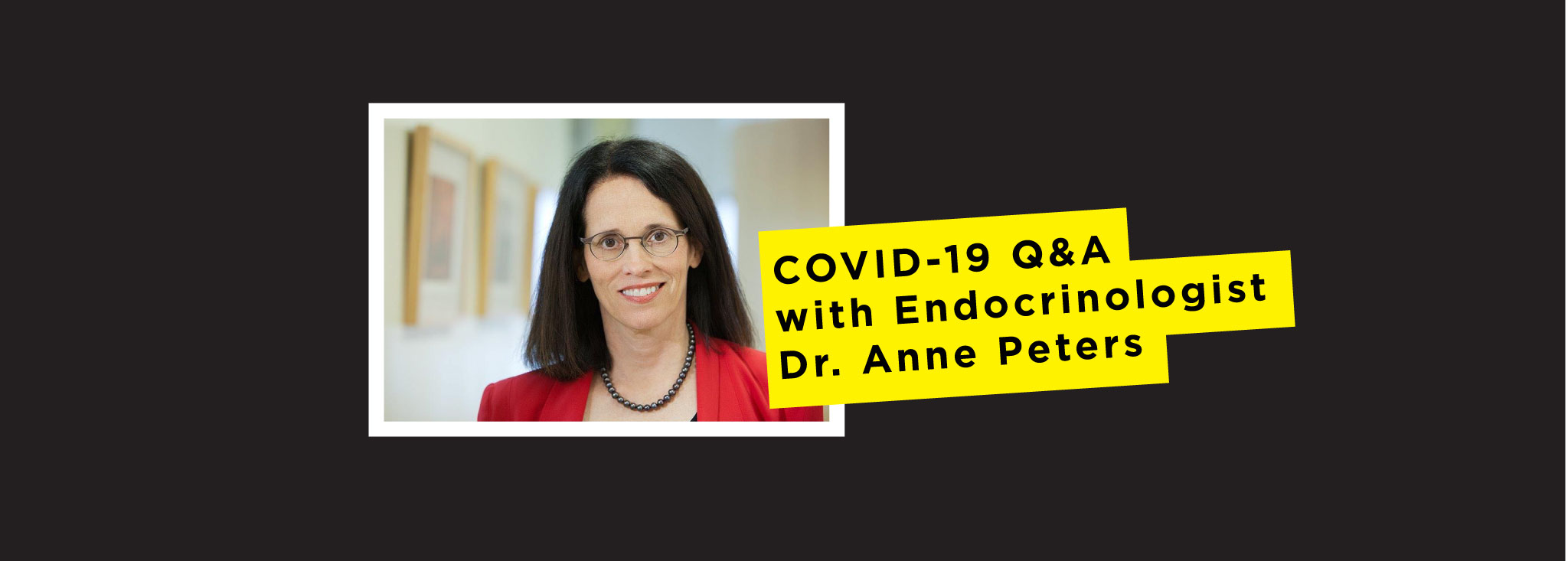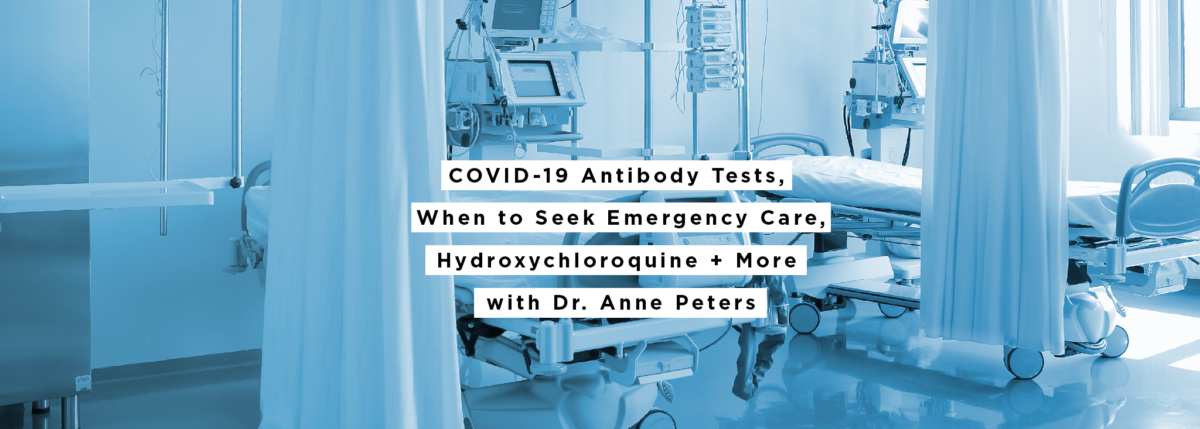COVID-19 Antibody Tests, When to Seek Emergency Care, Hydroxychloroquine + More with Dr. Anne Peters
Editor’s Note: We have a simple goal: tap into the power of the global diabetes community to save lives. Visit coronavirusdiabetes.org to learn more about what you can do as a person with diabetes to keep yourself and others safe from COVID-19 until we’re all safe.
This interview was published in April 2020.
Dr. Anne Peters is a clinical diabetologist at the University of Southern California and serves on Beyond Type 1’s Leadership Council. She recently took the time to answer more questions and share her latest updates about COVID-19 with the Beyond Type 1 community. Watch the entire interview in full!
Partial transcript below, edited for content and clarity
How will we return to normal? Are the tests popping up for COVID-19 antibodies (that gauge if you’ve ever had the disease) reliable?
Anne Peters: One of the ways in which we’re going to return to a somewhat more normal life is going to be through this notion of being able to capture cases of COVID-19 and then quarantine them and contain it within communities. Because it’s not going away, we just have to be safe and not catch it from someone.
There are two tests. There’s a PCR test, which tells you if you have the virus in your body. We’ve gotten good at those and that’s the way we’ve been finding out who has it. But the second test, and the test that all of us want is an antibody test. We do know that if you have something called IGG, an antibody that tells you you’ve had it, it can confer at least partial immunity for a while. So if any of you who have antibody test is positive for IGG, you may be at much less risk and you may be able to go forth in the world.
What’s happening is that everybody and their brother has come up with one of these tests. The reason you can’t trust a test yet, unless it’s validated by the FDA… is because there’s many different forms of a coronavirus. So you could take a test that says, yes, you have IGG. But if the person making that test didn’t make it specific enough, if it doesn’t pick up SARS coronavirus-2—that’s what makes COVID-19—it could mean that you had a head cold a year ago and that’s what it’s catching.
So until there’s an FDA approved COVID-19 antibody test, we can’t trust the ones that are out there?
You can’t know which ones to trust and not, and that’s the problem. If you can’t trust the test, and test positive for IGG, you don’t know what that means. So what if it’s wrong? I mean, what if it’s tested for the wrong coronavirus? The point is, is we’ve all been this darn careful. Keep being careful because I just don’t want people to get the wrong advice… Science is science. Science takes time. I know we want everything to be faster, and people are working really fast, but there’s some hard limit.
Have you changed any of your care recommendations for when people with diabetes should seek emergency medical care, if for example, they are at risk of diabetic ketoacidosis (DKA)?
My fundamental theory is that I can keep almost anybody out of the hospital if they have access to healthcare and know what to do. My own personal belief is that it’s inherently upon everybody with type 1 diabetes to have ketone test strips at home. Urine ketone test strips are fine, but the reason you need that is because an unexplained high blood glucose level, especially if you’re feeling sick, if it’s associated with increased ketones, moderate or above, means you need carbohydrates and insulin. Usually you have to double your correction. Ketones mean you’re resistant, resistance means more insulin to get rid of ketones.
I also think that people need to have some anti-emetic (anti-nausea medication), and I’m not sure all doctors prescribed this, but if you can’t keep down fluids, that’s the first thing. If you can’t keep down fluids that have glucose in them, then you can’t get insulin, and you have to go to the hospital. So as soon as someone’s vomiting too much, they just have to go. They just have to go, and they shouldn’t wait.
It really helps me to help manage somebody remotely if they have a continuous glucose monitor [CGM]. So if they have a Dexcom or a Libre, a continuous glucose monitor that I can look at on Tidepool or Clarity or whatever I have to look at it. If I have somebody who’s in early ketoacidosis, if I can just see their blood glucoses in real time, it’s really helpful to me to adjust their insulin and help them through it. To me, everyone should have CGM to help them through this period. I don’t usually push things on people, but right now I do.
Other than vomiting and not being able to keep fluids down, are there other times when you would say a patient definitely needs emergency care, say, for a certain levels of ketones?
Well, no. If somebody can keep down fluids and I can give them insulin, I can keep them out of the hospital. It’s the keeping down fluids part. Can you ingest carbohydrates as a substrate for the insulin? That’s all we need to give somebody. You could have large ketones. I mean, even non-diabetic people could get large ketones, but it means a different thing.
There are other things that would make me send people to emergency department, like if you’re having crushing chest pain. Older patients get cardiovascular events, and we’ve seen people, even kids in both Italy and in the United States now, who have new onset type 1 and the parents don’t really know what’s going on, but they keep the kids at home, and they don’t take them to the emergency department, and they end up sicker when they get there. So you can’t be completely scared of an emergency department. But if we can prevent it, obviously that’s a good thing.
What about in cases of severe hypoglycemia? We’ve been taught the official guidance is that anytime you use glucagon, you should call 911. What do you tell your patients to do if using glucagon or treating a severe hypo? Is emergency care required?
So this is the deal. It’s very complicated because in general I don’t want people to call 911.
If you have a severe hypoglycemic episode and you’re on the floor and somebody gives you glucagon and you wake up and you can eat, you can go back to normal. I don’t think there’s any need to call 911. Now, if there’s some weird reason, like someone fell off a ladder and broke a bone, I mean, you could call 911. But honestly, severe hypoglycemia to me is a treatable process that doesn’t require 911. Calling 911 is complicated. Most of the time they’re not going to want to transport you, but even if they do, they’re going to put you in an emergency department, and they’ll forget to feed you and you might go low again.
I would say have glucagon on hand. If you can have inhaled nasal glucagon, that’s my preference. More and more insurance plans are paying for that. So I would try to get that to have at home, but certainly injectable. Don’t call 911 unless there’s some overwhelming need to do it. Most of the time it seems to the person who’s treating the patient with severe hypoglycemia, like they’re never going to wake up, right? For most cases, again, unless there’s some other injury or prolonged seizure or some other thing happening, I wouldn’t call 911. The key is just to treat it at home and then eat something and go about your life. But if there’s some weird situation, then that might require more urgent care.
Can you talk a little bit about the importance of having a ‘Go Bag’ ready for people with diabetes on the off-chance that they may need to go to the hospital? What should be in that bag?
Well, there are two big reasons. One is because it’s been very hard for hospitals to test blood sugars because they have to put on new PPE and go in and have a whole suit because of the concern about COVID. I think that anytime somebody with type 1 diabetes goes to the hospital, even without COVID, it’s good to have everything you need with you. But the reason it’s particularly important now is because family members can’t come to the hospital and see you if you have COVID-19, and you want to make sure that you have your charging cable for your phone because people get there and then their phone dies and they can’t reach people. So it’s important to be able to charge your phone, your iPad, whatever you use to communicate, as well as your devices. Then it’s important to have extra sensors, extra infusion sets, extra of anything you might need to run whatever technology you can run in the hospital, as well as the strips, the lancets, the meter, just to be able to take care of it.
If you think about it, I think the scariest thing in the hospital is loss of control. For everybody with type 1 diabetes, they have within their skill set the ability to control that portion of it. If you get very sick and you’re on a ventilator, obviously you can’t control that. But anything short of that, many hospitals will let you manage your diabetes. But if you don’t have your pump supplies, and you don’t have what you need, then you’re not going to be able to do it. I don’t even care if they say you can’t test your blood sugars. No one’s going to stop you from doing it or looking at your sensor. I mean, you’re your own best doctor when it comes to your diabetes. Nobody but you knows your diabetes. Yes, we healthcare providers can help you. Yes, the hospital’s a different setting.
It’s a kind of thing where if you get sick in the next year or so, you just want to be extra vigilant about yourself and communicating with your healthcare team. It’s just the surprise components. I can’t predict COVID-19, and I’ve seen it in people without type 1, and it has various different flavors to it. So most of the time people are fine. Like I said, I still haven’t had anyone in the hospital, and I still haven’t had anyone die. So it’s survivable for most people, but you always got to be prepared for the worst outcomes.
What can you tell me about hydroxychloroquine (HCQ)? Are there any diabetes-specific concerns with taking it?
Hydroxychloroquine is an old drug, and it’s a derivative of chloroquine. Any of you who are as old as I am who traveled to Africa took chloroquine, and chloroquine is a really nasty drug. It makes you feel sick, and it can cause cardiac arrhythmias, and it can also cause trouble with your retina. Hydroxychloroquine is actually easier to take, and it’s been used for treating new entologic diseases, and it’s had a role. The problem with it is that even though it treats malaria, we haven’t proven that it treats the virus. But there were early studies from Wuhan in China where they gave people hydroxychloroquine and chloroquine, and they seem to do better than those who didn’t have it. Then they did a study in France where the same thing seemed to happen. But the problem is, is none of those patients were clean—meaning they just got only that drug. Because in China they were giving them all sorts of HIV drugs and all sorts of other things. So we don’t have a really clear randomized controlled trial that says it works. It might help. There is a theory that if you take it early that it might help prevent disease.
The problem with hydroxychloroquine again is that it can affect the retina, and anybody with retinopathy, I personally think, shouldn’t take it. The second thing is, is it can cause cardiac arrhythmias, and it could kill you, which is kind of bad. These side effects, by the way, have been known for like 30 years. If you happen to learn about these drugs, you would know that they have bad side effects, and that’s what’s in the package insert. So my feeling is, is if somebody wanted to do it, I’m not opposed to hydroxychloroquine. I don’t want to mix it with azithromycin, which is what they did in a small subset of five patients in France because azithromycin further worsens that effect on the heart and because there may be some micro damage to the heart from diabetes, who knows? I’m just careful about the heart.
The real treatment, I think, that may work is something called convalescent plasma, which means you take the plasma from someone who’s had the disease, and you give it to somebody who’s critically sick, and that gives the person antibodies, and it helps them get over the critical sick phase. That’s worked with a number of other disparate kinds of diseases, including viruses. There are studies at major medical centers ongoing where they do this. So that to me seems like something that could help.
Is there anything else you’ve learned about the coronavirus and diabetes since we last spoke two weeks ago?
So we don’t know anything more about type 1 diabetes. But what is interesting, and data that came out of France is that body mass index (BMI) is very closely related to outcomes. I mean, actually frighteningly so. So if you look at the people who die, most of them are heavy, and there’s something about being heavy that seems to increase your risk of death from coronavirus. Don’t quote me, I’m not an expert, but it might be that somehow being heavier puts your lungs in a worse position. It’s harder for you to breathe deeply, and the pressures on your lungs are different… If your BMI is greater than 35 you’re at much greater risk of having bad outcomes. As you go up in body mass index, the risk is higher. Above 30 is considered obese.
What I would argue is that if anything motivates people that are sitting around right now to work on weight loss and exercise, perhaps this is it. So the healthier you are truly, the better your outcome is going to be. So this isn’t specifically for diabetes as much as it is for everybody in the population to consider.
Read and watch our previous interviews with Anne Peters about COVID-19


The Latest on COVID-19 From Dr. Anne Peters
Dr. Anne Peters took time to check in about COVID-19 and give us her latest updates, especially pertaining to diabetes care as this situation is unfolding.MORE






